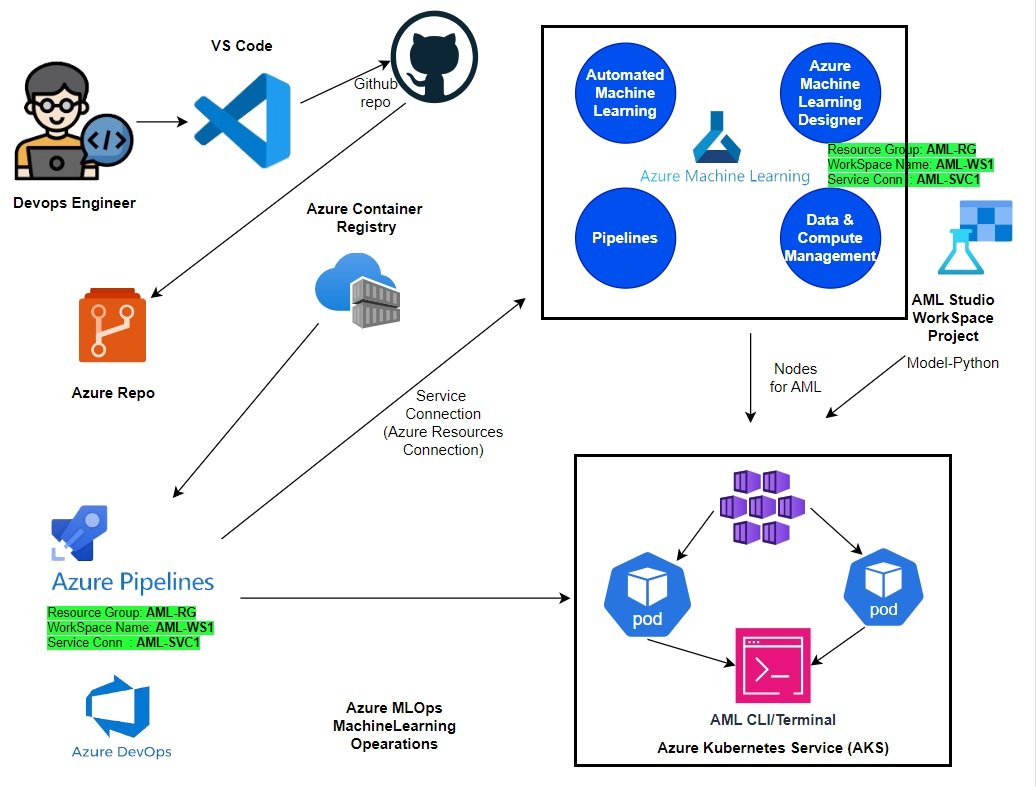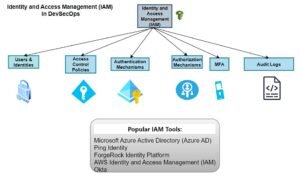This is Simple Diagram to understand the flow of Azure Machine Learning(AML) with Azure Devops in Azure Kubernetes Services(AKS) and managed as MLOPS
Machine Learning Operations (MLOps) is a set of practices and principles that aims to streamline and operationalize the entire machine learning lifecycle, from model development to deployment and monitoring, in a consistent and efficient manner. MLOps borrows concepts from DevOps (Development Operations) and applies them to the domain of machine learning to address challenges specific to ML projects
Azure MLOps– is a Devops for Machine Learning
Azure Machine Learning (AML) is a cloud-based platform by Microsoft that enables data scientists and developers to build, train, deploy, and manage machine learning models. It offers a range of tools and services to support the entire machine learning lifecycle, from data preparation to model deployment and monitoring.
Here’s an overview of its key features and capabilities:
Data Preparation: Azure ML provides tools for data ingestion, preparation, and transformation. Users can connect to various data sources, clean and preprocess data, and perform feature engineering tasks to prepare datasets for model training.
Model Development: It offers a range of machine learning algorithms and frameworks, including both traditional statistical methods and modern deep learning techniques. Users can experiment with different algorithms and hyperparameters using Jupyter notebooks or Azure ML’s visual interface.
Model Training: Azure ML supports distributed training across clusters of CPU or GPU instances, enabling users to train models on large datasets quickly and efficiently. It also provides automated machine learning capabilities, which can automatically try multiple algorithms and hyperparameter settings to find the best-performing model.
Model Evaluation and Tuning: Users can evaluate model performance using various metrics and techniques, such as cross-validation and hyperparameter tuning. Azure ML provides tools for comparing multiple models and selecting the best-performing one for deployment.
Model Deployment: Once a model is trained and evaluated, Azure ML makes it easy to deploy it as a web service or containerized application. Users can deploy models to Azure Kubernetes Service (AKS), Azure Container Instances (ACI), or as a serverless Azure Function.
Scalability and Integration: Azure ML is designed to scale to handle large datasets and complex machine learning workloads. It integrates with other Azure services such as Azure Data Lake Storage, Azure Databricks, and Azure Synapse Analytics, allowing users to leverage the full power of the Azure ecosystem.
Monitoring and Management: After deployment, Azure ML provides monitoring and management capabilities to track model performance, detect drift, and retrain models as needed. Users can set up alerts and automate model retraining based on predefined criteria.
Security and Compliance: Azure ML incorporates various security features to protect data and models, including role-based access control (RBAC), encryption, and compliance certifications such as GDPR and HIPAA.
Overall, Azure Machine Learning simplifies the process of building and deploying machine learning models, allowing organizations to accelerate innovation and derive insights from their data more effectively.
Azure DevOps
Azure DevOps is a suite of cloud-based collaboration tools developed by Microsoft. It provides a set of services for software development, including version control (with Git repositories), continuous integration and continuous delivery (CI/CD), project management, automated testing, and more. Azure DevOps helps development teams to plan, build, test, deploy, and monitor applications efficiently and collaboratively. It integrates seamlessly with Microsoft Azure, but it can also be used with other cloud platforms and on-premises environments.
Azure Kubernetes Service (AKS)
Azure Kubernetes Service (AKS) is provided by Microsoft Azure, it is a managed container orchestration service. It’s simplifies the deployment, management, and scaling of containerized applications using Kubernetes, an open-source platform for automating the deployment, scaling, and management of containerized applications.




